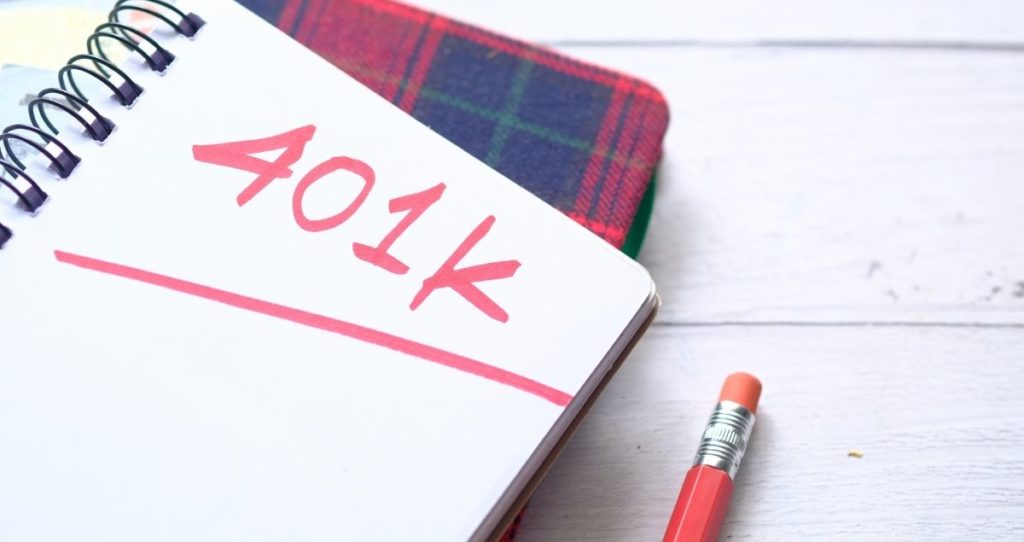If you are looking for easy ways to borrow money, taking a 401(k) loan might be a smart idea. 401(k) loans are flexible, easy to qualify for, and requirements are much simpler than private loans. Before you take out a loan against your retirement savings, there is a limit to how much you can borrow from a 401(k) plan.
The IRS allows you to borrow up to 50% of your vested account balance with a maximum of $50,000 whichever is lower in any given 12-month period. For example, if you have a $110,000 401(k) account balance, the maximum you can borrow from your 401(k) account is $50,000. But, if your vested 401(k) balance is $60,000, you can borrow up to $30,000.
Unlike private loans where you can have up to 30 years to pay them off, your 401(k) loan must be paid off within 5 years. If you default on your loan, the unpaid balance will become a distribution and you will owe a 10% penalty if you are under 59 ½.
Here is everything you need to know about borrowing from your 401(k) plan.
What is a 401(K) loan?
Saving for retirement through a 401(K) plan comes with a lot of benefits. One of these benefits is the option to borrow money from your 401(k) plan and pay it off slowly. This loan is known as a 401(K) loan. How much you can borrow from your 401(k) loan, the terms on your loan, and fees vary from one plan to another.
A 401(K) loan allows you to access your retirement savings without paying tax or early withdrawal penalty. Just like any other loan, you must pay the principal and interest on the money you borrowed. All payments will go back into your account. In simple terms, a 401(K) loan is like taking money from your account and depositing it back in the same account with interest.
401(K) loans are easier to qualify than conventional loans and their terms are flexible. This is because you are borrowing your retirement savings and paying it back to yourself. The biggest downside of borrowing against your 401(k) loan is that it directly affects the account growth and you risk defaulting on your loan.
How much can you borrow from your 401(K)?
Just because you have the money in your 401(K) plan, it does not mean you can empty the account. There is a limit to how much you can borrow from your 401(K) plan. Not every 401(k) plan allows loan options and those that do have limitations to how much you can borrow. The IRS also has regulations regarding 401(k) loans.
According to the Internal Revenue Service (IRS), you can borrow the lesser of 50% of the vested amount in your account or $50,000. That is the maximum you can borrow from your 401(K) account is $50,000. An exception can apply when 50% of the vested balance is less than $10,000. When you fall into this category, you may be eligible to borrow up to $10,000. Some retirement plans do not have this exception.
Account providers are not required to provide 401(K) loan options. However, if your plan has 401(K) loan options, you must follow the terms and conditions of your specific plan.
401(K) loan example
Let’s assume that your 401(K) plan has a vested amount of $200,000. In this case, you can borrow a maximum of $50,000. This is because 50% of your vested balance is $100,000 which is greater than the $50,000 limit allowed by the IRS in 401(K) loans.
If, for example, your vested balance is $36,000, you can borrow up to $18,000. This is because 50%($18,000) of your vested balance is less than the maximum allowed.
How long do you have to pay off a 401(K) loan?
Your 401(K) loan must be paid off within 5 years and payments are usually made quarterly. That is you are expected to make 4 payments per year. In case you use the loan to buy your primary residence, an exception to this 5-year limit can apply.
Before you borrow against a 401(k) loan, your company may require you to provide written consent from your spouse for a loan over $5,000. When taking a 401(k) loan, your employer will give you details regarding your specific plan which include the maximum you can borrow, interest rate, the number of 401(k) loans allowed, etc.
What happens when you default on a 401(K) loan?
The amount you borrowed against your 401(K) plan must be paid back on time together with interest. If you cannot pay it off, your loan will be defaulted.
When you default on your 401(K) loan, the IRS will treat the unpaid amount as a distribution. Unless you are at least 59½, you will owe a 10% penalty. Additionally, the defaulted balance will be subjected to income tax.
Learn more: What happens when you default on a 401(k) loan?
What happens when you quit your job before paying off your 401(K) loan?
There are times when you will have to leave your job for another, quit your job, or simply get fired. So, what will happen if you quit your job before paying off your 401(K) loan?
If you quit your job before paying off your 401(K) loan, you might be required to pay off the remaining balance upon termination. Failure to make successful payments will put you into a default. After you have defaulted, the unpaid balance will become a distribution. As a result, you will end up paying a 10% penalty if you are not 59½ or older. Furthermore, you will pay the applicable tax on your balance.
Related: What happens to a 401(K) loan when you quit your job?
How long do you have to pay off your 401(k) loan balance when you quit your job?
When you quit your job, the 401(k) loan 5-year repayment time will no longer apply. You get five years only when you continue working for the same company. You must pay off the remaining balance of your 401(K) loan(s) upon termination.
Some employers might give you a 60-day grace period to pay off the remaining balance. If your employer terminates your employment, you will have up to the due date of your federal income tax return. After this period, any remaining balance will become a distribution.
How to avoid immediate tax liability on the remaining 401(K) loan balance after leaving your job?
If you cannot pay off all your 401(K) loans within the allowed payment period, consider alternatives to avoid tax liabilities and income tax.
The IRS suggests the following option. If you want to avoid an immediate income tax, roll over a portion or all of your outstanding 401(K) loans to an individual retirement account(IRA) or in a qualified retirement plan.
The rollover must be completed before the due date of your federal tax returns of the year in which your loan becomes a distribution.
What is the 401(K) loan interest rate?
Borrowing from your own 401(K) and paying the money back in the same account does not sound like a normal loan. To some, it sounds like moving money from your account to another account you own.
But, your 401(K) loan indeed comes with an interest. The interest rate you will pay and the principal amount will go back into your account. That is you are paying interest to yourself by moving money from one account to another.
How much is the 401(k) loan interest?
According to Debt.org, you should expect to pay one or two points above the prime rate. One point stands for 1% and two points mean 2%. In other words, the 401(K) loan interest rate will be between 1% and 2% above the prime rate.
For example, if the prime rate is 6%, your 401(K) loan interest rate will be between 7% and 8%.
A prime rate is an interest rate financial institutions such as banks, credit unions, mortgage lenders, etc. charge their best borrowers. Being the best borrower means that you have excellent credit, an excellent credit score, a low debt-to-income (DTI) ratio, and stable income, and you are more likely to meet all terms of the loan compared to other groups of borrowers.
Many people take 401(K) loans due to consistency in interest rates regardless of credit score. In addition, 401(K) loans are more attractive because all payments go back to the employee instead of the bank.
Benefits of 401(k) loans
If you are not sure whether taking out a 401(k) loan is great for you, here are the benefits of 401(k) loans to help you decide.
- Immediate access to funds. A 401(k) loan provides you with instant access to your own money with a simple loan application
- No credit check. 401(k) loans generally do not require a credit check, making them great if you have bad credit.
- Lower Interest Rates. The interest rates on 401(k) loans are typically lower than other forms of debt, such as credit cards or personal loans. This could save you significant money over the life of the loan.
- You pay the loan back to yourself. When you take a 401(k) loan, you essentially borrow from yourself and make payments back to yourself
- 401(k) loans are flexible. 401(k) loans often have flexible terms compared to conventional loans.
- A 401(k) protects you from an early withdrawal penalty. With a 401(k) loan you avoid paying a 10% penalty and income tax
Drawbacks of 401(K) loans
- Borrowing against your 401(k) plan comes with unique risks that affect your savings growth and the possibility of loan default.
- Some of the drawbacks of 401(K) loans you should know.
- If you default, you will pay taxes and a 10% penalty if you are under 59½
- Not every employer offers 401(K) loan options.
- You cannot take 401(K) loans from your former employers
- The interest you pay to yourself will result in double taxation
- You also pay an origination fee that is between $50 to $100. Sometimes it can go higher.
- You disrupt the compounding interest which results in lower retirement income.
Is a 401(k) loan good for you?
A 401(k) loan might be right for you depending on your circumstances. For example, if you want access to large sums of money and want to pay a lower interest rate, a 401(k) loan will be good for you. Taking a loan against your retirement savings will also be good for you if you cannot qualify for conventional loans at a reasonable rate.
If you are choosing between taking a 401 (k) loan and making a withdrawal, always pick a 401(k) loan to avoid penalty and tax.
Borrowing from your 401(k), however, can lead to a habit of dipping into your retirement funds for current expenses, which can significantly reduce your future savings. Additionally, you might leave or lose your job and the balance might become due much sooner which can affect your ability to repay the loan. Failing to repay the loan can result in substantial tax liability and penalties.
More retirement tips
What happens to a 401(K) loan when you quit your job?
What is a Traditional IRA and how does it work?
8 Benefits of Roth IRA you did not know about








